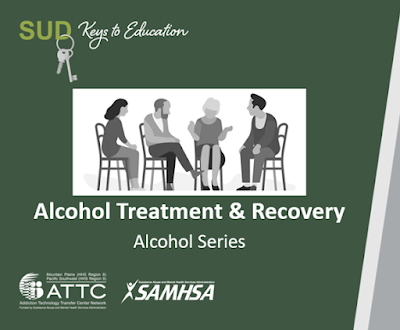By Nancy A. Roget, MS and Cindy Juntunen, PhD, Mountain Plains ATTC
According to Benjamin Franklin, “For the best return on your
money, pour your purse into your head.” This is sound advice and one that
SAMHSA has followed through its funding of the Addiction Technology Transfer Centers (ATTCs). The ATTCs emphasize preparing the SUD workforce to use
evidence-based practices when providing SUD services (harm reduction,
treatment, and recovery support) to patients and their families through
training and technical assistance activities. Preparing the SUD workforce
targets both licensed/certified professionals as well as students.
The Mountain Plains ATTC is one of the original 11 ATTCs. In 1993 the grant was located at the University of Nevada with Dr. Gary Fisher as the initial project director. Called the Mountain West ATTC it first served the states of Montana, Nevada, and Wyoming from 1993-1998. Five subsequent successful grant awards (1998 to present) included new partnerships and changes to the states served.
Currently, the Mountain Plains ATTC is housed at the University of North Dakota in partnership with the University of Nevada (Nevada) working with Region 8 which includes six states: Colorado, Montana, North and South Dakota, Utah and Wyoming.
Despite changes over the last 30 years, one area of focus remains a priority for the Mountain Plains ATTC: academic programs and products.
During the initial funding period, the Mountain Plains ATTC built academic programs at Nevada and Great Falls University in Montana, with academic courses also created for the University of Wyoming. The investment of SAMHSA grant dollars built an undergraduate minor and a graduate emphasis in Addiction Treatment Services at Nevada.
These academic programs still exist; 800-plus students are
enrolled and taking undergraduate and graduate courses on prevention, harm
reduction, treatment, and recovery support services in-person and online in
Spring Semester 2023.
From 1998, on, the Mountain Plains continued its focus on academic programs and products which include but are not limited to:
- Cross-walk that listed the practice domains of the TAP21 Practice Domains and Competencies for academic courses/curricula- 1999
- Work Groups (2000 - present) that include academic faculty from universities and tribal colleges throughout the region, who provide input to ATTC staff on curricular needs as well as the upcoming workforce
- Nevada undergraduate courses developed for online delivery 2001
In 2001 the Mountain Plains ATTC created a curriculum infusion effort in response to faculty and institutions reporting difficulties in implementing new programs and courses due to costs and lack of faculty with specific expertise. This infusion process was successfully utilized to find “curricular room” (Dimoff, et al., 2017; Gassman et al., 2001) for SUD and mental health (MH) information as well as a way of highlighting SUD/MH information within a context of a discipline (Redding & Selleck, 1999) This effort was consistent with findings from curriculum infusion research, which demonstrated that the uptake of science-based knowledge into professional practice occurs more frequently if it is ‘functionally relevant’ (Savage, et al., 2018; Taylor & Rafferty, 2003) meaning, taught within a specific discipline or profession.
Finally, the Mountain Plains developed Curriculum
Infusion Packages to support faculty who may have limited SUD expertise. The Mountain
Plains ATTC partnered with several different ATTCs to create: slide decks with
notes, videos, audio recordings, and experiential learning experiences, and
test questions on the neurobiology of addiction, stimulants, and self-care. The
purpose of the infusion model is to assist faculty in infusing new knowledge, typically
evidence-based practices (EBPs), into existing courses by offering brief ”bites
of information.”
In keeping with the curriculum infusion methodology, the Mountain Plains ATTC and Pacific Southwest ATTC created a product called SUD Keys to Education (SUD Keys), in January 2023.
This product includes slide decks that are intentionally brief so instruction can be infused in five to 10-minute segments, with some longer options available. Slide decks (not PDFs) are easily downloaded and prepared for immediate use by instructors. Many of the slide decks include video (MP4) recordings and can be used as an alternative instructional delivery method.
For example, the audio slide decks and videos can be played during live training events or downloaded and listened to by students/participants prior to the class or the event (flipped classroom approach). Slide decks currently available include: Stimulants; Alcohol; Stigma; Recovery Support; and Harm Reduction.
Links to the SUD Keys product are available at the Mountain
Plains and Pacific Southwest ATTCs’ websites.
This product carries on the ATTC’s 30-year tradition of investment in the SUD
workforce through curated academic products.
References
Dimoff, J. D.,
Sayette, M. A., & Norcross, J. C. (2017). Addiction training in clinical
psychology: Are we keeping up with the rising epidemic? American Psychologist,
72(7), 689–695. https://doi.org/10.1037/amp0000140
Gassman, R. A., Demone Jr, H. W., & Albilal, R. (2001).
Alcohol and other drug content in core courses: Encouraging substance abuse
assessment. Journal of Social Work Education, 37(1),
137-145. https://doi.org/10.1080/10437797.2001.10779042
Redding, B. A., & Selleck, C. S. (1999). Perinatal
substance abuse education: A review of existing curricula. Substance
Abuse, 20(1), 17-31. https://doi.org/10.1023/A:1021344722132
Savage, C. L.,
Daniels, J., Johnson, J. A., Kesten, K., Finnell, D. S., & Seale, J. P.
(2018). The inclusion of substance use-related content in advanced practice
registered nurse curricula. Journal of Professional Nursing, 34(3),
217–220. https://doi.org/10.1016/j.profnurs.2017.08.006
Taylor, I., & Rafferty, J. (2003). Integrating research and teaching in social work: Building a strong partnership. Social Work Education, 22(6), 589-602. https://doi.org/10.1080/0261547032000142698


No comments:
Post a Comment